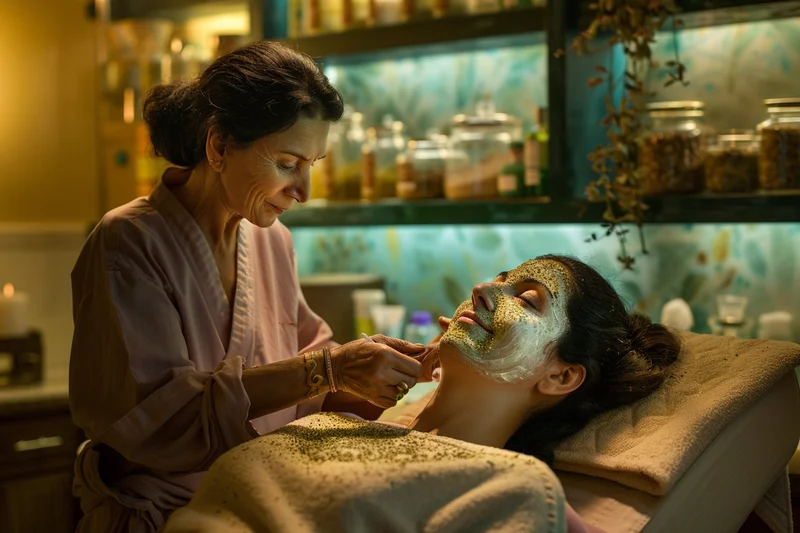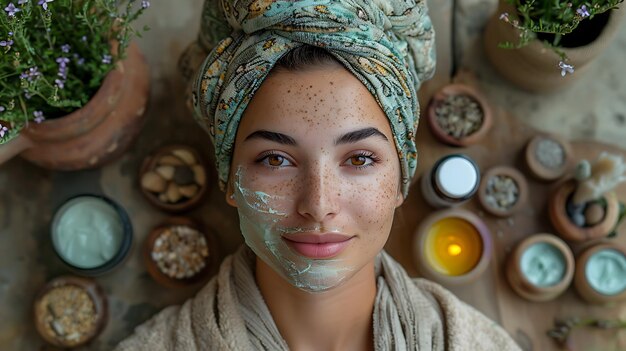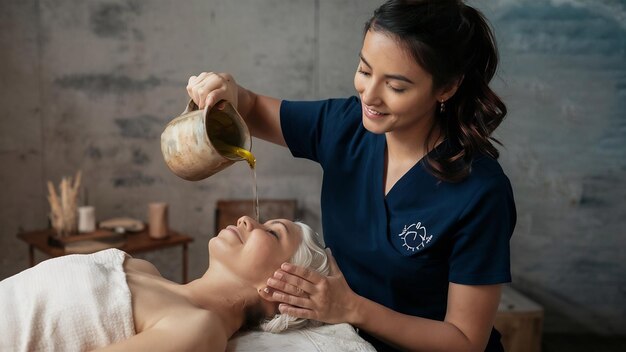Ask Ayurvedic doctor a question and get a consultation online on the problem of your concern in a free or paid mode. More than 2,000 experienced doctors work and wait for your questions on our site and help users to solve their health problems every day.
Ayurvedic Treatments and Remedies for Skin Diseases

Skin is the largest organ in our body. Applying cosmetics or taking care of it externally won’t help preserve this exquisite organ of ours. Your skin speaks volumes about the state of your mind, gut, and overall health. Skin-related issues vary widely in severity and symptoms. They may be mild, painful, temporary, or permanent. Some may have hereditary roots, while others have situational origins. Ayurvedic treatment for skin diseases provides secure, all-natural remedies for a wide range of conditions.
Skin Disease: The Cause
Some common causes of skin disorders include bacteria that are lodged in hair follicles and skin pores. Microbes, parasites, viruses, or fungi that reside on the skin. Another major cause of skin disorders is a compromised immune system and exposure to irritants, allergies, or the diseased skin of another person.
There are diet factors where many skin conditions can result from consuming large amounts of yogurt, salmon, black beans, radish, jaggery, fermented foods, fatty foods, and sour foods made with vinegar or sauce. Furthermore, eating too much and consuming foods that shouldn’t go together, like milk and fish or sour fruits and milk, can also contribute to skin disorders. Certain skin diseases can also arise as a result of a variety of medical conditions and lifestyle choices. Some skin conditions can be passed on genetically in some subsequent generations. The cause of several skin diseases is unknown.
Don't wait or self medicate. Start chat with Doctor NOW
Skin Disease: The Ayurvedic View
According to Ayurveda, improper living habits and food decisions that contradict a person’s fundamental nature or constitution, or Prakriti, are the root causes of all illnesses and disorders in the body. Although imbalances in any of the three doshas can cause skin problems, the Pitta dosha, or heating element, is more frequently implicated. Skin issues can arise from any action that aggravates the body’s heat element. Ayurveda advises diagnosing a person’s food habits, lifestyle, pulse, overall health, and dosha composition accurately in addition to analyzing their skin condition. Correcting the imbalance of doshas in the body is the major goal of Ayurvedic treatment for skin problems.
Common Skin Diseases Treated with Ayurveda
-
Acne: Often caused by excess Pitta dosha, acne manifests as pimples, blackheads, and inflammation on the skin.
- Eczema (Atopic Dermatitis): Characterized by itchy, inflamed skin, eczema is often triggered by Vata and Pitta imbalances.
- Psoriasis: An autoimmune disorder that leads to the rapid growth of skin cells, psoriasis is associated with Pitta dosha imbalance.
- Vitiligo: Loss of skin pigmentation, often caused by a combination of genetic and environmental factors, can be treated by balancing the body’s doshas.
- Dry Skin: Typically caused by an imbalance in Vata, dry skin can lead to flaky, cracked, and itchy skin.
- Fungal Infections: Fungal growths on the skin, such as ringworm, athlete's foot, and candidiasis, can be managed with Ayurvedic antifungal herbs and treatments.
Ayurvedic Remedies for Skin Diseases
-
Steam bath therapy: During the steam bath, to eliminate physical, mental, and emotional toxins that are deeply lodged in the tissues, the body is heated while the brain and heart are kept calm. While the therapeutic steam may penetrate and cleanse profoundly across the entire body without overheating and stressing the body, the cold head and heart promote a sense of openness and peace.
- Detoxification (Panchakarma): Panchakarma, a detoxification process in Ayurveda involves eliminating toxins from the body. This ancient practice can be beneficial in managing chronic skin conditions by cleansing the system and promoting overall well-being. Various Panchakarma procedures like Vamana, Virechan, Basti, Raktamokshan etc are employed according to the state and stage of the disorder and the strength of the patient.
- Diet: According to Ayurveda, you should eat according to your body’s natural hunger and thirst signals. During meals, according to Ayurveda, your stomach should be full of food, water, and air, with a focus on fresh foods. The fundamental idea of Ayurveda is that eating foods that are incompatible with your body produces toxins, which lead to an imbalance in your basic bodily parts.
- LEPA Therapy: A medicinal application with a herbal paste that penetrates deeply. The natural texture and health of the skin tissue is restored with this potent treatment. It reduces inflammation and infection by eliminating toxins from the body’s lymphatic system and conditioning the skin.Various other therapies like dhara, utsadana, avagaha etc are prescribed in various cases.
- Lifestyle and Exercise: Physical activity and exercise are good for the skin in general and for getting rid of the toxins that cause skin conditions.
- Stress Management: Stress is a known trigger for many skin disorders. Ayurveda recognizes the mind-body connection and emphasizes stress reduction through practices like yoga, meditation, and deep breathing exercises.
- Dosha Balance: According to Ayurveda, our body is governed by three doshas. Vata, Pitta, and Kapha. Skin disorders often arise from imbalances in these doshas along with the rasa dhatu, rakta dhatu, mamsa dhatu, meda dhatu getting vitiated . Ayurvedic practitioners tailor treatments to restore equilibrium through lifestyle adjustments, diet, and specific herbs.
Ask-Ayurveda and its significance
Ask-Ayurveda, a pioneering Ayurvedic wellness brand, stands as a trailblazer in advocating comprehensive health solutions. Its unwavering commitment to well-being is evident through a diverse range of Ayurvedic remedies crafted specifically to address the patient’s concerns. From personalized remedies to herbal ones supporting overall well-being, Ask-Ayurveda stands as a natural haven for people seeking holistic alternatives.
Online Ayurveda Consultations
In the contemporary hustle and bustle, convenience is paramount.Ask-Ayurveda recognizes this need and provides online Ayurvedic consultations, enabling people to access personalized advice from experienced Ayurvedic practitioners within the comforts of their homes. Booking a free pre-online consultation with Ask-Ayurveda presents a valuable opportunity for discussing individual health concerns and receiving expert guidance on seamlessly integrating Ayurveda into one’s lifestyle. The digital age has revolutionized healthcare services, and Alveda exemplifies this transformation by offering online consultations. This virtual platform empowers people across Europe to connect with experienced Indian Ayurvedic doctors, fostering a holistic approach to health. Through these online sessions, individuals can openly discuss their concerns, obtain personalized advice, and gain insights into Ayurvedic practices tailored to their unique needs.
Book Your Free Pre-Online Consultation
Ask-Ayurveda distinguishes itself by offering a complimentary pre-online consultation, allowing individuals to experience the benefits of Ayurveda firsthand. This initiative facilitates an understanding of how Ayurveda aligns with individual health goals. It serves as an opportunity to book your free pre -online consultation and explore the holistic approach, seek answers to
queries, and make informed decisions about integrating Ayurveda into their wellness journey.
Conclusion
In the journey to healthy skin, Ayurveda offers a comprehensive and holistic approach that goes beyond merely addressing symptoms. By understanding the individual’s dosha constitution, incorporating detoxification processes, and utilizing herbal remedies, Ayurveda aims to restore balance to the body, mind, and spirit. As we navigate the complexities of modern skin disorders, the timeless wisdom of Ayurveda continues to provide valuable insights for achieving radiant and resilient skin. Remember, consulting with a qualified Ayurvedic practitioner is crucial for personalized and effective treatment plans.
Frequently Asked Questions About Ayurvedic Treatments for Skin Diseases
1. How does Ayurveda treat skin diseases?
Ayurveda treats skin diseases by addressing the root cause, which is often an imbalance in the body’s doshas—Vata, Pitta, and Kapha. Ayurvedic treatments use a combination of herbal remedies, dietary recommendations, detoxification therapies, and lifestyle adjustments to restore balance and promote healthy, radiant skin.
2. What are some common Ayurvedic herbs used for skin diseases?
Common Ayurvedic herbs used for skin diseases include Neem, Turmeric, Aloe Vera, Manjistha, and Tulsi (Holy Basil). These herbs have anti-inflammatory, antimicrobial, and rejuvenating properties that help treat conditions like acne, eczema, psoriasis, and fungal infections.
3. How does a sattvic diet help with skin health?
A sattvic diet, which is light, nutritious, and easy to digest, is recommended in Ayurveda for promoting mental clarity and physical health. It helps balance the doshas, reduces inflammation, and supports detoxification, leading to improved skin health by flushing out toxins and promoting clear, glowing skin.
4. What is Panchakarma, and how does it benefit skin diseases?
Panchakarma is a series of Ayurvedic detoxification treatments that help cleanse the body of toxins (ama). Through therapies like Abhyanga (oil massage) and Virechana (purgation), Panchakarma helps reduce inflammation, improve circulation, and restore balance to the body, contributing to healthier skin.
5. Can Ayurvedic oils help with skin diseases?
Yes, Ayurvedic oils like Neem Oil, Coconut Oil, Lavender Oil, and Sandalwood Oil have been used for centuries to treat various skin conditions. These oils offer antimicrobial, soothing, and moisturizing properties that can help heal skin conditions like acne, eczema, dry skin, and fungal infections.
6. How long does it take to see results with Ayurvedic treatments for skin diseases?
The time it takes to see results varies depending on the severity of the skin condition and the individual’s adherence to the Ayurvedic treatment plan. With regular use of Ayurvedic herbs, dietary adjustments, and lifestyle changes, visible improvements can generally be seen within a few weeks to a few months.
7. Are Ayurvedic treatments for skin diseases safe?
Yes, Ayurvedic treatments are generally safe when prescribed by a qualified Ayurvedic practitioner. Since Ayurvedic remedies use natural herbs and oils, they are less likely to cause side effects compared to conventional treatments. However, it is essential to consult with a certified practitioner to ensure the right treatment for your skin type and condition.



